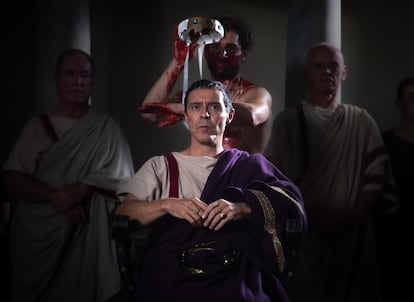‘Brutal and genocidal’: Dissecting Julius Caesar to warn us about Trump and other strongmen
A BBC documentary about the Roman dictator shows how his excessive ambition for power ultimately overthrew a republican system. The film also draws parallels between him and current forms of populism

The BBC documentary Julius Caesar: The Making of a Dictator is centered around the man who liquidated the Roman Republic. Caesar has enjoyed historical prestige ever since the second century AD, when Plutarch put him at the level of Alexander the Great in Parallel Lives, his series of biographies. Centuries later, through Shakespeare and Hollywood, the Roman general and statesman became further universalized. Even in the Astérix comics, in which the Gauls resisted him, he was treated as a respectable figure and a worthy enemy.
This three-episode British miniseries pulls no punches: it shows Julius Caesar as a cunning, calculating, unscrupulous man — a prisoner of excessive ambition who didn’t give up his efforts until he became dictator for life. He is clearly defined as a figure who destroyed five centuries of republican tradition. A system that — if it cannot be called completely democratic — was at least participatory, had a Senate and used elective procedures for its consuls, who had limitations on their power. What followed was something entirely different: five centuries of despotic empire.
In the series, Julius Caesar is referred to as “brutal, ruthless [and] genocidal on a large-scale,” as well as “dishonorable, immoral, anti-religious and [tyrannical].” It’s noted that he massacred more than 400,000 people in his conquests of Gaul, in violation of Roman laws.
The production is a docudrama, a genre that’s experiencing a sudden boom. However, in this case, the historians and politicians who participate in it — including Thomas Holland, Rory Stewart and Shami Chakrabarti — take the lead, while the dramatized scenes are silent, offering an attractive background image for the narrative.
The entire documentary is firmly attached to Caesar’s political career. There aren’t many details about his private life: not even his relationship with Cleopatra is mentioned, which worked so well in the 1963 production. His daughter Julia is only talked about because he married her off to Pompey, and her death during childbirth broke the link between the two men. Nor is Caesar’s legendary aptitude for military strategy analyzed. The focus is more on how he came to power over the course of 16 years, as the lessons from that era are still considered to be valid. All of the secondary characters in the production are either his rivals or political allies, which are very fickle categories. They include the aforementioned Pompey, Crassus, Cato, Cicero, Mark Antony, Cassius and Decimus. And, of course, Brutus, who, while claiming to be a defender of the Republic, found no other way to overthrow tyranny than by killing the tyrant.
Caesar’s dirty tricks are thoroughly detailed, as are his ever-shifting alliances and the violence that he exercised without hesitation, either directly or through gangs of thugs that he sent to intimidate or assassinate his political enemies. He had a capacity to unleash chaos and present himself as the only salvation. The film also explains Caesar’s charisma: how he became a hero to his people thanks to his military triumphs, and how he convinced the masses that he was with them and against the elites. He created a motto around the notion of “freedom.” Some of his merits that are recognized include the promotion of infrastructure, improved food distribution and lavish shows, elements of the expression “bread and circuses,” which referred to how Rome’s rulers kept the population complacent.
The central thesis of the BBC documentary is that Julius Caesar was a “populist capable of corrupting an entire state.” This is what links him with the world of today, in which democracies showing signs of decadence are producing leaders with authoritarian traits who violate the spirit and rules of the system. Donald Trump is cited in the film several times, as is Jair Bolsonaro, because both men, in the 21st century, instigated assaults by their followers on the legislative branches of their respective countries, in the same way that the Roman Senate was attacked by Caesar’s faithful before it was converted into a veritable puppet theater. Italy’s Silvio Berlusconi and Russia’s Vladimir Putin are also mentioned in passing.
From Caesar came the term “Caesarism,” which, in political science, defines an authoritarian ideology. Clearly, many Caesars now abound in this hyper-connected world of ours poisoned by tension. A second Trump term would be much more dangerous than the first for the most powerful country on the planet: he no longer needs to deceive anyone, but can go about his business without a mask. He recently noted that, if he wins, there will be no violence, but, if he doesn’t win, “it depends.”
Trump isn’t the only contemporary leader with short-term prospects for victory. There are many people around the world who surrender to the pull of the strongman. The experts who have portrayed Caesar in the BBC documentary warn viewers that they shouldn’t take democracy for granted, nor should they lose sight of other, modern Caesars. Nothing is happening today that couldn’t have happened in the ancient world.
Sign up for our weekly newsletter to get more English-language news coverage from EL PAÍS USA Edition
Tu suscripción se está usando en otro dispositivo
¿Quieres añadir otro usuario a tu suscripción?
Si continúas leyendo en este dispositivo, no se podrá leer en el otro.
FlechaTu suscripción se está usando en otro dispositivo y solo puedes acceder a EL PAÍS desde un dispositivo a la vez.
Si quieres compartir tu cuenta, cambia tu suscripción a la modalidad Premium, así podrás añadir otro usuario. Cada uno accederá con su propia cuenta de email, lo que os permitirá personalizar vuestra experiencia en EL PAÍS.
¿Tienes una suscripción de empresa? Accede aquí para contratar más cuentas.
En el caso de no saber quién está usando tu cuenta, te recomendamos cambiar tu contraseña aquí.
Si decides continuar compartiendo tu cuenta, este mensaje se mostrará en tu dispositivo y en el de la otra persona que está usando tu cuenta de forma indefinida, afectando a tu experiencia de lectura. Puedes consultar aquí los términos y condiciones de la suscripción digital.









































